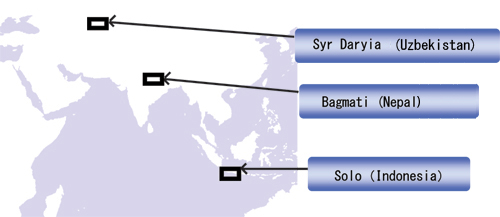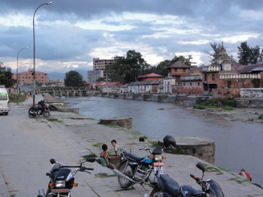NARBO
JWA and ADB to Collaborate in a Water Security Improvement Project in Asian River Basins
![]()
Japan Water Agency (JWA) and Asian Development Bank (ADB) jointly started a collaboration project in the Asian region to provide technical assistance in water security improvement. This is based on the letter of intent (LOI), signed by ADB President Haruhiko Kuroda and JWA President Toshiki Aoyama on 12 January 2009, for collaboration in strengthening in IWRM in river basins through investment projects and demonstration projects that can be replicated in the region.
http://www.narbo.jp/narbo/event/rp_09_adb-jwa_loi.htm
After an intensive process of concretizing the LOI, both organizations finally reached an agreement to officially start a regional technical assistance project. The Partnership Agreement on Supporting Investment in Water Security in River Basins (PA) was concluded on 15 November 2010. The PA was signed by three representatives – Director General Xianbin Yao of the ADB Regional and Sustainable Development Department, Director General Juichi Kamimura of the JWA Water Resources Engineering Department, and NARBO Secretary General Katsuaki Kawano.
The project is officially called “Regional Capacity Development Technical Assistance (R-CDTA) 7547: Supporting Investment in Water Security in River Basins” and scheduled to be carried out until May 2012. The project cost is funded by ADB using Japan Special Fund (JSF) , part of which will be provided to JWA to cover the necessary expense. JWA also will provide any expertise from its longstanding IWRM experience.

The project comprises two components; *(i) preparation for future investment programs, and *(ii) in-country and regional capacity development. It focuses on water security improvement in the Solo River in Indonesia, the Bagmati River in Nepal, and the Syr Darya River in Uzbekistan. Regional exchange of information and experience and knowledge networking will also be facilitated so that lessons learned can be shared in the region. The role of JWA is to offer technical assistance that will help each country make effective investment for water security in the future, and to facilitate regional exchange of information and experience and knowledge networking among NARBO members and ADB’s
developing member countries (DMCs) through regional workshops and NARBO activities.
Some of the key activities included in the first component are as follows:
In Indonesia, the project is expected to provide
-
technical advice to the river basin organization (RBO) and various provincial organizations in the Solo River Basin on assessing investment requirements and identifying priority project activities to improve water security through water allocation and distribution, water conservation, and flood management; and
-
technical advice through stakeholder workshops to help the RBO and provincial organizations conduct a study and demonstration activities in support of a long-term road map for an integrated water resources management (IWRM) investment program.*(ii)
In Nepal, the project is expected to
 Bagmati River at Pashupatinat temple;
Bagmati River at Pashupatinat temple; religiously important river for the people
in Kathmandu
-
review and assess the Bagmati Action Plan published by High Powered Committee for Integrated Development of the Bagmati Civilization (HPCIDBC, the RBO for the upper basin) and National Trust for Nature Conservation (NTNC) in 2009, which addresses water and related soil, land, and environmental issues in the upper Bagmati River Basin, and advise on how to strengthen the existing action plan to improve water governance in the basin;
-
conduct a study and demonstration activities, such as a basin water balance study and steps to introduce water user inventories, after consultations with the government;
-
help expand the Bagmati Action Plan to increase water security in the middle and lower reaches, drawing on the results of past studies and projects and a consultative process with stakeholders;
-
assist in prioritizing the extended action plan's candidate investment and capacity-building projects into an IWRM investment project; and
-
consult on the most recent reforms for introducing IWRM in Nepal and in priority river basins.
In Uzbekistan, the project will aim to
-
assess national IWRM progress and to identify priority water security issues; and
-
conduct a study aimed at improving water security in Uzbekistan's territory of the Syr Darya River Basin, which will be implemented through stakeholder consultations, advisory services, and workshops. Possible IWRM issues for assessment will be selected among the following topics:
| (a) | reinforcement of existing water facilities, including proper maintenance practices (pilot facilities to be selected among dams or others) and an investment project to rehabilitate the facilities;
|
| (b) | modernization of the monitoring system for water resources management, including hydrological and meteorological monitoring systems, and preparation and implementation of an investment plan to modernize the system; and
|
| (c) | improved management of the supply-side facilities for effective water use, including development of sound procedures for maintenance of reservoirs, canals, and control structures.
|
The second component will help counterpart agencies in the participating countries to develop ownership and capacity to plan and implement their IWRM investment programs. Regional exchange of information and experience and knowledge networking will also be facilitated through regional workshops and NARBO activities so that lessons learned in the project and NARBO members can be shared in the region.
JWA and ADB have already made some initial visits to Nepal and Uzbekistan, and discussed with key counterparts detailed activities for smooth implementation. Also some experts have been invited from Nepal to participate in the 4th NARBO General Meeting in Indonesia.
JWA will contribute to the project for the next one and a half years and will report the progress of the project through the NARBO website and newsletters.